Search results for "lola rogers"
In defence of small people
15 November 2012 | Non-fiction, Reviews
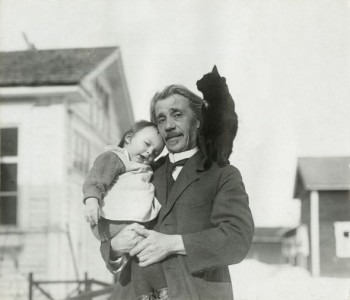
Teuvo Pakkala with grandson Teuvo-Pentti and Mirri the cat. Photo: F. Suomela / Otava, 1922
The best-known work of author Teuvo Pakkala (1862–1925) is Tukkijoella (‘On the log river’, 1899), Finland’s most-performed play. The song-studded comedy set in motion a phase of ‘logger romanticism’ in Finnish literature which later spread to film as well. Like the cowboy of the old west, the wandering lumberjack became the prototype for the Finnish masculine adventurer.
The entertaining musical play was a blockbuster. Pakkala’s works of more literary significance, however, encountered more difficulty. His short story collections on the lives of children – Lapsia (‘Children’, 1895) and Pikku ihmisiä (‘Little people’, 1913) – were greeted with flattering acclaim, but marked the author as hopelessly ‘effeminate’, as the critics put it. The stories were read as a kind of child-rearing guide, or even as tales for children. It wasn’t until much later, in the second half of the 20th century, that these psychological studies of children were re-examined as early gems of the short story form by a contemporary of Freud. More…
Prix Femina for Sofi Oksanen
5 November 2010 | In the news
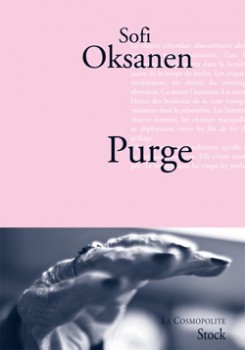 Sofi Oksanen’s novel Puhdistus (English translation, Purge, by Lola Rogers; French translation, also entitled Purge, by Sébastien Cagnoli), was awarded the French literature prize Prix Femina Étranger in early November.
Sofi Oksanen’s novel Puhdistus (English translation, Purge, by Lola Rogers; French translation, also entitled Purge, by Sébastien Cagnoli), was awarded the French literature prize Prix Femina Étranger in early November.
The Prix Femina was founded by the editors of the magazine La Vie heureuse (nowadays Femina) in 1904 as a counterbalance to the Prix Goncourt and the male-dominated award system. The jury members of Prix Femina are women only – whereas the prize can be awarded to either gender.
Among earlier winners of the Prix Femina Étranger – awarded since 1985 for the best foreign novel – are Amos Oz, Joyce Carol Oates and Ian McEwan.
The rights of Oksanen’s novel have so far been sold to 36 countries; Purge has sold approximately half a million copies the world over. In France – where the book also won the Le Prix du Roman Fnac in June – four print runs have sold more than 70,000 copies.
The mighty word
15 November 2012 | Fiction, Prose
‘Mahtisana’, a short story from the collection Lapsia (‘Children’, 1895). Introduction by Mervi Kantokorpi
Mother and Dad hadn’t said a single word to each other since lunchtime. The children, Maija and Iikka, were quiet, too. They sat apart, Iikka on the chair at the end of the sofa, where he could see the moon through the window, and Maija next to the window looking out on the street, where children moved about on skis and sleds. They didn’t dare make a sound, not even a whisper to ask for permission to go outside. It had been so quiet all that Sunday evening that when Mother spoke, encouraging them to go out and play, both of them nearly jumped.
They left without saying a word, Maija creeping quite silently. Even out in the courtyard she and Iikka still spoke in whispers as they decided which hill to go to. They didn’t really want to go anywhere, but when they came out to the street and could hear the happy shouts of children from every direction, it refreshed their spirits. Maija sat Iikka down on the sled and set off at a run, pulling him behind her. She felt as if her gloomy mood was falling away in pieces to be trampled underfoot.
A few streets down there was a large crowd of boys on the corner. They decided to go and see what was happening. More…
The mistake
30 September 2008 | Archives online, Fiction, Prose
A short story (‘Erehdys’, 1956, last published in the collection Lukittu laatikko ja muita kertomuksia, ‘A locked box and other stories’, WSOY, 2003). Introduction by Markéta Hejkalová
My feet are smarter than my head. On an April night in Naples they carried me along the Via Roma past the royal palace and the giant illuminated dome of the church. The people of Naples walked up and down the immortal street like the cool of evening, looking at each other and at the brightly lit display windows. I had nothing against that, but at the comer of Via San Brigida my feet turned to the right. The snow-cold breath of my homeland radiated toward me from Saint Bridget Street.
When I had turned the corner I could see a restaurant window still lit, with its fruit baskets, dead fish and red lobsters. The most hurried diners had already finished their meals. I stepped into the long dining room of the restaurant, the sawdust on the floor stuck to my shoes, a frighteningly icy stare pierced me from behind the counter, but I gathered my courage and whispered bravely, ‘Buona sera, signora.’ More…
Success after success
9 March 2012 | This 'n' that
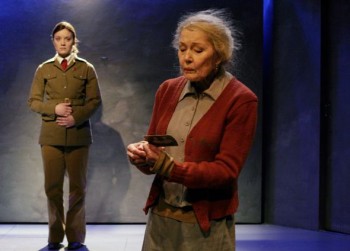
The women of Purge: Elena Leeve and Tea Ista in Sofi Oksanen's Puhdistus at the Finnish National Theatre, directed by Mika Myllyaho. Photo: Leena Klemelä, 2007
Sofi Oksanen’s Purge, an unparalleled Finnish literary sensation, is running in a production by Arcola Theatre in London, from 22 February to 24 March.
First premiered at the Finnish National Theatre in Helsinki in 2007, Puhdistus, to give it its Finnish title, was subsequently reworked by Oksanen (born 1977) into a novel – her third.
Puhdistus retells the story of her play about two Estonian women, moving through the past in flashbacks between 1939 and 1992. Aliide has experienced the horrors of the Stalin era and the deportation of Estonians to Siberia, but has to cope with the guilt of opportunism and even manslaughter. One night in 1992 she finds a young woman in the courtyard of her house; Zara has just escaped from the claws of members of the Russian mafia who held her as a sex slave. (Maya Jaggi reviewed the novel in London’s Guardian newspaper.) More…
Slowly does it
5 November 2009 | Reviews

Straight from the oven: cabbage rolls. – Photo: Sami Repo
Mummola
[Grandma’s house]
(food: Hans Välimäki, photographs: Sami Repo, text: Mikko Takala, graphic design: Timo Numminen)
Helsinki: Otava, 2009. 224 p., ill.
ISBN 978-951-1-23930-7
€ 40
How paradoxical: in the past couple of decades, numerous internationally famous gourmet restaurants have sprung up in Finland, and at the same time it’s harder than ever to find ordinary, well-prepared ingredients for cooking at home.
It’s hard to get used to the fact that foods like beef and lamb kidneys, sweetbread, and cheaper cuts for use in stews and soups have made way for cheap Brazilian steaks on special offer, even at the largest stores’ meat counters. There’s no point in looking for whole chickens (and certainly not organic poultry), let alone whole, locally caught fish. The last time I asked at the fish counter of my local market if they might have any salmon heads and bones for chowder, the seller looked for a moment like she might summon security. The consumer wasn’t consulted when ‘taste’ and ‘variety’ were replaced by ‘ease’ and ‘speed’. More…
Serious comics: Angoulême 2011
24 February 2011 | This 'n' that

Graphic artist Milla Paloniemi went to Angoulême, too: read more through the link (Milla Paloniemi) in the text below
As a little girl in Paris, I dreamed of going to the Angoulême comics festival – Corto Maltese and Mike Blueberry were my heroes, and I liked to imagine meeting them in person.
20 years later, my wish came true – I went to the festival to present Finnish comics to a French audience! I was an intern at FILI – Finnish Literature Exchange, and for the first time, FILI had its own stand at Angoulême in January 2011.
Finnish comics have become popular abroad in recent years, which is particularly apparent in the young artists’ reception by readers in Europe. Angoulême isn’t just a comics Mecca for Europeans, however: there were admirers of Matti Hagelberg, Marko Turunen and Tommi Musturi from as far away as Japan and Korea.
The festival provides opportunities to present both general ‘official’ comics, ‘out-of-the-ordinary’ and unusual works. The atmosphere at the festival is much wilder than at a traditional book fair: for four days the city is filled with publishers, readers, enthusiasts, artists, and even musicians. People meet in the evenings at le Chat Noir bar to discuss the day’s finds, sketching their friends and the day’s events.
As one Belgian publisher told me, ‘There have always been Finns at Angoulême.’ Staff from comics publisher Kutikuti and many others have been making the rounds at Angoulême for years, walking through the city and festival grounds, carrying their backpacks loaded with books. They have been the forerunners to whom we are grateful, and we hope that our collaboration with them deepens in the future.
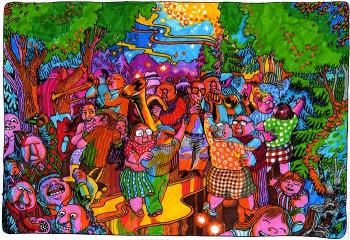
Aapo Rapi: Meti (Kutikuti, 2010)
This year two Finnish artists, Aapo Rapi and Ville Ranta were nominated for the Sélection Officielle prize, which gave them wider recognition. Rapi’s Meti is a colourful graphic novel inspired by his own grandmother Meti [see the picture right: the old lady with square glasses].
Hannu Lukkarinen and Juha Ruusuvuori were also favorites, as all the available copies of Les Ossements de Saint Henrik, the French translation of their adventures of Nicholas Grisefoth, sold out. There were also fans of women comics artists, searching feverishly for works by such artists as Jenni Rope and Milla Paloniemi.
Chatting with French publishers and readers, it became clear that Finnish comics are interesting for their freshness and freedom. Finnish artists dare to try every kind of technique and they don’t get bogged down in questions of genre. They said so themselves at the festival’s public event. According to Ville Ranta, the commercial aspect isn’t the most important thing, because comics are still a marginalised art in Finland. Aapo Rapi claimed that ‘the first thing is to express my own ideas, for myself and a couple of friends, then I look to see if it might interest other people.’
Hannu Lukkarinen emphasised that it’s hard to distribute Finnish-language comics to the larger world: for that you need a no-nonsense agent like Kirsi Kinnunen, who has lived in France for a long time doing publicity and translation work. Finnish publishers haven’t yet shown much interest in marketing comics, but that may change in the future.
These Finnish artists, many of them also publishers, were happy at Angoulême. Happy enough, no doubt, to last them until next year!
Translated by Lola Rogers
A family affair
24 October 2013 | In the news
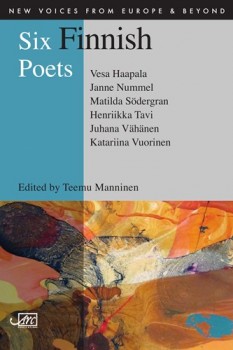 Six Finnish poets, edited by Teemu Manninen – a poet himself – is the tenth volume in a series of bilingual anthologies bringing contemporary poetry from around Europe to English-language readers.
Six Finnish poets, edited by Teemu Manninen – a poet himself – is the tenth volume in a series of bilingual anthologies bringing contemporary poetry from around Europe to English-language readers.
One of the poets introduced is a Finland-Swede, Matilda Södergran, whose poems are presented in their original Swedish alongside the English translations. The other poets, all of whom write in Finnish, are Vesa Haapala, Janne Nummela, Henriikka Tavi, Katariina Vuorinen and Juhana Vähänen. Their translators are Emily & Fleur Jeremiah, Lola Rogers and Helen R. Boultrum.
In his introduction Teemu Manninen briefly outlines the developments of contemporary Finnish poetry around the turn of the 21st century. The poets chosen were born in the 1970s and 1980s; their work could be characterised variously as experimental, surrealist, minimalist and ironic.
According to Manninen, during the last couple of decades, a ‘do-it-yourself’ culture has sprung up among people interested in performing poetry, organising independent festivals and clubs, and disseminating their work via the Internet. New, cheaper methods of publishing printed books have also contributed to a growing interest in poetry and to its popularity. Even so, contemporary poetry is not something that attracts large crowds; people involved in this sort of ‘literary activism’ tend to know each other well.
So, ‘in Finland, poetry is a family affair,’ notes Manninen. ‘The familial communality has to be acknowledged if one is to understand the kind of poetry currently being written in Finland….’ It mostly lives and thrives independent of large publishers, newspapers and literary prizes.
The anthology series is entitled New Voices from Europe and Beyond; it is published in the UK by Arc Publications in co-operation with Literature Across Frontiers.
Childhood revisited
31 March 2006 | Archives online, Fiction, Prose
Extracts from the novel Tämän maailman tärkeimmät asiat (‘The most important things of this world’, Tammi, 2005). Introduction by Jarmo Papinniemi
I was supposed to meet my mother at a café by the sea. She would be dressed in the same jacket that I had picked out for her five years ago. She would have on a high-crowned hat, but I wasn’t sure about the shoes. She loved shoes and she always had new ones when she came to visit. She liked leather ankle boots. She might be wearing some when she stepped off the train, looking out for puddles. She didn’t wear much make-up. I don’t remember her ever using powder, although I’m sure she did. I could describe her eye make-up more precisely: a little eye shadow, a little mascara, and that’s all.
That’s all? I don’t know my mother. As a child, I lived too much in my own world and it was only after I left home that I was able to look at her from far enough away to learn to know her. She had been so near that I hadn’t noticed her. More…
Midsummer madness
31 December 2005 | Archives online, Fiction, Prose
An extract from the novel Voimattomuus (‘Powerlessness’, WSOY, 2005). Introduction by Maila-Katriina Tuominen
Cast:
a man
a woman
a boy
Midsummer Eve. A cabin.Outside it’s raining a little, but the blanket of clouds is already breaking up.
It’s bright in the cabin, like daylight. The table is set.
A bunch of wild violets, torn from its means of support, droops in the middle of the table, surrounded by stemmed glasses and paper napkins folded into the shape of swans. The champagne, aquavit and white wine are still chilling.
A man and a woman walk into the cabin wearing bathrobes. She has a terrycloth towel wound around her head like a turban. They’re coming from the sauna. He looks at the table with surprise. The table is set for three.
She notices the man’s gaze and hurries into the bedroom to get dressed.
He takes a beer out of the refrigerator and sits down at the table in his bathrobe.
A long silence. More…
A long dream
9 October 2009 | Fiction, Prose
A short story from Jälkikasvu (‘Offspring’, Otava, 2009)
‘I was eating a late breakfast, without a care in the world, when it happened.’
He snaps off the recorder. He has said the same thing three times now, but he always loses his train of thought right there. Why is it so difficult to continue? In his mind, the next part feels quite clear, but the words simply won’t come out of his mouth. He ought to say that his wife left him yesterday, on the twelfth of February, at 10:48 AM, following a three-minute fifteen-second briefing. More…
Fight Club
16 April 2012 | Fiction, Prose
A short story from Himokone (‘Lust machine’, WSOY, 2012). Interview by Anna-Leena Ekroos
Karoliina wondered whether her name was suitable for a famous poet.
Her first name was alright – four syllables, and a bit old-fashioned. But Järvi didn’t inspire any passion. Should she change her name before her first collection came out? Was there still time? She had four months until September.
Even if The flower of my secret was the name of some old movie, Karoliina clung to the title she’d chosen. It described the book’s multifaceted, erotically-tinged sensory world and the essential place of nature in the poems. Karoliina loved to take long walks in the woods. Sometimes she talked to the trees.
She had been meeting new people. At the writer’s evening organised by her publisher, she’d been seated next to Märta Fagerlund, in the flesh. Karoliina had read Fagerlund’s poems since her teens, and seen her charisma light up the stage on cultural television shows.
At first Karoliina couldn’t get a word out of her mouth. She just blushed and dripped gravy on her lap. But the longer the evening went on, the more ordinary Märta seemed. She was even calling her Märta, and telling her about a new friend on Facebook who said how ‘awfully funny’ Märta was. In fact, the squeaky-voiced Märta, with her enthusiasm for Greece, was a bit dry, and, after three glasses of white wine, tedious. But Karoliina never mentioned it to anyone, because she wasn’t a spiteful person. More…
Horse sense
2 February 2012 | Essays, Non-fiction
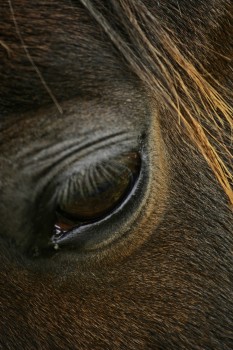
The eye that sees. Photo: Rauno Koitermaa
In this essay Katri Mehto ponders the enigma of the horse: it is an animal that will consent to serve humans, but is there something else about it that we should know?
A person should meet at least one horse a week to understand something. Dogs help, too, but they have a tendency to lose their essence through constant fussing. People who work with horses often also have a dog or two in tow. They patter around the edge of the riding track sniffing at the manure while their master or mistress on the horse draws loops and arcs in the sand. That is a person surrounded by loyalty.
But a horse has more characteristics that remind one of a cat. A dog wants to serve people, play with humans – demands it, in fact. With a dog, a person is in a co-dependent relationship, where the dog is constantly asking ‘Are we still US?’ More…

